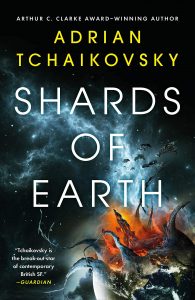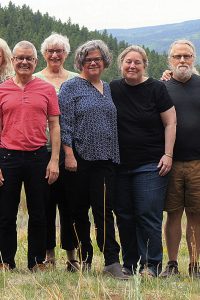The Year in Review 2021 by Russell Letson
 Here we are, two years into a pandemic, with half of the nation arguing with the other half like grumpy uncles at a holiday dinner, and the planet deciding whether it’s time to raise those sea levels a meter or ten or just blow us all away in megastorms, and I’m sitting at home, reading. And not books about stopping climate change or improving our civic character, but space operas. Nearly half of my review reading for 2021 fits that rather fuzzy category. Have I been avoiding the up-close unpleasantness of our various acute and chronic problems by lighting out for the territory of far-off adventures?
Here we are, two years into a pandemic, with half of the nation arguing with the other half like grumpy uncles at a holiday dinner, and the planet deciding whether it’s time to raise those sea levels a meter or ten or just blow us all away in megastorms, and I’m sitting at home, reading. And not books about stopping climate change or improving our civic character, but space operas. Nearly half of my review reading for 2021 fits that rather fuzzy category. Have I been avoiding the up-close unpleasantness of our various acute and chronic problems by lighting out for the territory of far-off adventures?
On reflection, I suspect that in reading “space operas”(as marketers and blurb writers label them), I am actually reading significant swathes of SF-in-general, and that even the gaudiest of them are containers for the same anxieties as can be found in dystopian nightmares and explicitly monitory fiction. (To repeat myself, endlessly and annually, what follows is not an account of where the field is going or has gone or ought to go, but a report on my particular, idiosyncratic reading in 2021.)
Modern space opera extends across conventional genre boundaries. In fact, it may be that the defining characteristic of post-pulp-era space opera is not so much physical “outer space”as thematic scope and scale–a story space where multiple genres and trope families can jostle and interact. Or perhaps another metaphor: space opera is an armature, a structural support that can carry the weight of everything from planetary romance to anthropological experiment to political drama to alien encounter to cosmological speculation (plus, of course, starships and monsters and blowing stuff up).
 That is certainly what I find in the work of Neal Asher (Jack Four), James S.A. Corey (Leviathan Falls), Arkady Martine (A Desolation Called Peace), Alastair Reynolds (Inhibitor Phase), and Adrian Tchaikovsky (Shards of Earth). All of these writers have devised sprawling, intricate settings that invite–or even demand–something beyond space battles or voyages of discovery or future-military organizations and careers. It is no accident that these are all parts of series rather than singletons–a good playground (in the Nivenian sense) needs the elbow-room.
That is certainly what I find in the work of Neal Asher (Jack Four), James S.A. Corey (Leviathan Falls), Arkady Martine (A Desolation Called Peace), Alastair Reynolds (Inhibitor Phase), and Adrian Tchaikovsky (Shards of Earth). All of these writers have devised sprawling, intricate settings that invite–or even demand–something beyond space battles or voyages of discovery or future-military organizations and careers. It is no accident that these are all parts of series rather than singletons–a good playground (in the Nivenian sense) needs the elbow-room.
We speak of “world building,”but a series background is also a collection of enabling devices, accommodations for any number of narratives. A world that can hold space operatics also has room for other stories–and space operatics do not happen in a (thematic or cultural) vacuum. Even though most of Asher’s Jack Four is planet- or habitat-bound, it is the Polity background that provides the Rogue Male-like chases-and-escapes and the monsters and the monstrous competence and resilience of its protagonist. In the other direction, the space-navy component of Martine’s A Desolation Called Peace rests on the political-intrigue and cultural-encounter side of its world, developed in the decidedly non-space-operatic A Memory Called Empire. And the Expanse series was from the beginning a busy collision of motifs and traditions and cross-genre mashups, set loose in a future that allowed its central cast to run through whole libraries of subgenres before coming to a close in Leviathan Falls.
Reynolds’ Inhibitor Phase and Tchaikovsky’s Shards of Earth are perhaps the closest to straight-up space opera, but even their linear chase/quest structures are punctuated by sub-adventures and encounters and special-effects set-pieces, and their emotional atmospheres are anything but sunny. In all these novels, inhuman and unintelligible forces threaten not just individuals but entire societies or species or organic life itself. Inhibitor Phase is especially dark-tinged, with its guilt-haunted protagonist, huddled refugees, and images of civilizations in ruins.
Perhaps what is attracting me is not so much space operatics but the story spaces that can hold them and their kin. And there are other sets of enabling devices that are similarly commodious. Ken MacLeod’s Beyond the Hallowed Sky and Charles Stross’s Invisible Sun produce worlds of disorder and dangerous order, hopeful and dystopian political visions, embedded in alternate timelines–though MacLeod’s alternate 21st century is a machine for generating interstellar, planetary, and alien-encounter adventure, with, to be sure, a substrate of bolshie political thinking. Stross’s combination of historiographic alternate-worlds adventure with the political-intrigue thriller cuts even closer to the bone. His multiverse shows how many ways humans can make trouble for themselves–and how that multiverse might contain monsters even worse than we are.
 Of course, 2021 wasn’t all space battles and interstellar empires and alien threats, though the other imaginary worlds could be as strange as one could want. In The Book of All Skies, Greg Egan offers a very odd (and very carefully devised, with equations and diagrams) physical environment that generates a voyage of exploration and discovery, which then leads to examinations of the social and economic machineries generated by the environment.
Of course, 2021 wasn’t all space battles and interstellar empires and alien threats, though the other imaginary worlds could be as strange as one could want. In The Book of All Skies, Greg Egan offers a very odd (and very carefully devised, with equations and diagrams) physical environment that generates a voyage of exploration and discovery, which then leads to examinations of the social and economic machineries generated by the environment.
Two other sets of travels also play games with genre conventions and expectations. Greg Bear’s The Unfinished Land is unambiguously fantasy, while Adrian Tchaikovsky’s Elder Race collects a catalogue of fantasy tropes and proceeds to explain them via SF machineries. The way that both employ the furniture of fantasy, while resolving in opposite metaphysical directions, says something about the common roots of these sibling genres. Both books present puzzles not unlike Egan’s: What is the nature of this fantastic world, and what might be its relationship to ours? And both address the importance of Story itself, regardless of the brand name on the package.
Much of the pleasure of reading three single-author collections came from observing the variety of stories their authors have produced. “Bruno Argento,”Bruce Sterling’s Italian alter ego in Robot Artists and Black Swans, is as nimble and playful as his American persona, mixing globalist-futurological scenarios with literary game-playing and genre-bending. Alastair Reynolds stretches out in Belladonna Nights. Several stories are set in his Revelation Space and House of Suns universes, but the rest take some of the same themes and motifs in quite different directions. And The Best of Walter Jon Williams shows off the range of one of the field’s most extravagantly inventive and surprising writers.
So I’m thinking that the pleasure I find in these books is not that of mere distraction (as much as I love being taken out of myself and my pandemic-narrowed world) but of delight at the ingenuity with which they are constructed, the surprising turns of the-same-only-different which I find at the heart of all art: the pleasures of recognition, of theme and variation, of transformation, of seeing the familiar in the new and vice versa.
Reluctantly selected recommendations:
The Book of All Skies, Greg Egan
Beyond the Hallowed Sky, Ken MacLeod
A Desolation Called Peace, Arkady Martine
Elder Race, Adrian Tchaikovsky
Shards of Earth: The Final Architecture Book One, Adrian Tchaikovsky
The Best of Walter Jon Williams, Walter Jon Williams
Russell Letson, Contributing Editor, is a not-quite-retired freelance writer living in St. Cloud MN. He has been loitering around the SF world since childhood and been writing about it since his long-ago grad school days. In between, he published a good bit of business-technology and music journalism. He is still working on a book about Hawaiian slack key guitar.
This review and more like it in the February 2022 issue of Locus.
 While you are here, please take a moment to support Locus with a one-time or recurring donation. We rely on reader donations to keep the magazine and site going, and would like to keep the site paywall free, but WE NEED YOUR FINANCIAL SUPPORT to continue quality coverage of the science fiction and fantasy field.
While you are here, please take a moment to support Locus with a one-time or recurring donation. We rely on reader donations to keep the magazine and site going, and would like to keep the site paywall free, but WE NEED YOUR FINANCIAL SUPPORT to continue quality coverage of the science fiction and fantasy field.
©Locus Magazine. Copyrighted material may not be republished without permission of LSFF.







